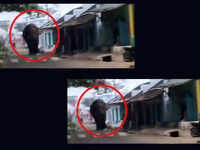If you want to stop climate change, you need to take action today: Jadav Payeng
P Sangeetha | TNN | Feb 1, 2019, 12:37 IST
When shutterbugs asked conservationist Padma Shri Jadav ‘Molai’ Payeng, to pose for the camera while planting a sapling near the Singanallur Lake recently, he responded with a grin, “Let me first plant the sapling. Why don’t you all learn how to do it?” The forest man of India is very particular about his mission of planting saplings and conserving nature.
“Former president the late APJ Abdul Kalam had appreciated my work and had told me that I should continue to do what I have been doing, instead of giving lectures and attending events to gain publicity,” said Jadav Payeng.
Jadav’s tryst with nature conservation began when he was 16 years old. He had just returned to his hometown in Aruna Sapori, a river island on the banks of Brahmaputra in Jorhat, Assam. The entire family had relocated to another village many years ago after a major deluge in the region. On his homecoming, Jadav saw more than hundred snakes lying dead due to excessive heat. The floods had washed them away to a sandbar that had no trees. But this time around, he did not want to take a chance. “I was extremely worried then. I approached the Deori community and learnt about snake conservation. They asked me to plant bamboo trees to salvage the situation and offered me 50 bamboo shoots and 25 bamboo saplings. I used to make holes in the sandbar, sow seeds, plant saplings and take care of them dutifully. The sea water would also bring a lot of waste which had seeds from faraway places. All these seeds germinated and after 36 years, the entire region grew into a dense forest. Scientists said that I was born to grow trees. Today, the 1316-hectare Molai forest is home to the royal Bengal tiger, rhinoceros, rabbits, deers and birds. The forest named after me is on the Majuli island of Brahmaputra.”
Despite spending more than three decades to create a forest, it wasn’t all bed of roses after that for Jadav. “Few years later, a herd of elephants entered the forest and destroyed houses and farmlands in the locality. The villagers immediately blamed me for the rampage. I told them that I had only planted the trees and that trees didn’t destroy houses. They threatened me and said that they would destroy the forest that I had so painstakingly created. I told them that before they cut the trees, they should cut me. After few days, I saw a group of people coming to my forest. I shooed them away thinking they were poachers. They came again the next day with a gamosa. (Gamosa is a piece of cloth with a red border, which has great significance among people of Assam) The group which included documentary filmmaker Jithu Kalitha studied me for two years. The first article on me was published in The Times of India. I was also honoured at the Jawaharlal Nehru Univeristy and given the identity; The Forest Man of India.I was honoured with the Padma Shri in 2015.”
Jadav says that the need of the hour is to get extremely serious about the environment. ”We plant saplings only on special occasions like Earth Day. Plants have to be nurtured well to grow into healthy trees. Only if we take care of them, can we see a green cover. At schools, environmental science shouldn’t be relegated to a subject in the curriculum. Children should be asked to plant saplings regularly and care for them. After five years, they should be planting a new set of trees. Parents and schools should ensure that trees are not cut and that poachers don’t hunt animals and birds on the trees. Instead of cutting cakes on birthdays, why not celebrate the occasion by planting and distributing saplings?”
Jadav stresses that it’s important to plant indigenous varieties for better results. “It’s good to see so many forests In Tamil Nadu and we should work toward conserving them. Every state in the country has a different weather and landscape. What works in Assam will not work in Tamil Nadu. Hence, we should focus on the indigenous species of the region. The best time to plant a sapling is just before the monsoon as there is no need to water them constantly. We should start cultivating at the outskirts of the cities to create green spaces in concrete jungles. It’s good to see so many lakes in and around Coimbatore. We should protect water bodies to preserve bio-diversity. If you want to stop climate change from getting worse, you need to take action from today.”
Jadav’s tryst with nature conservation began when he was 16 years old. He had just returned to his hometown in Aruna Sapori, a river island on the banks of Brahmaputra in Jorhat, Assam. The entire family had relocated to another village many years ago after a major deluge in the region. On his homecoming, Jadav saw more than hundred snakes lying dead due to excessive heat. The floods had washed them away to a sandbar that had no trees. But this time around, he did not want to take a chance. “I was extremely worried then. I approached the Deori community and learnt about snake conservation. They asked me to plant bamboo trees to salvage the situation and offered me 50 bamboo shoots and 25 bamboo saplings. I used to make holes in the sandbar, sow seeds, plant saplings and take care of them dutifully. The sea water would also bring a lot of waste which had seeds from faraway places. All these seeds germinated and after 36 years, the entire region grew into a dense forest. Scientists said that I was born to grow trees. Today, the 1316-hectare Molai forest is home to the royal Bengal tiger, rhinoceros, rabbits, deers and birds. The forest named after me is on the Majuli island of Brahmaputra.”
Despite spending more than three decades to create a forest, it wasn’t all bed of roses after that for Jadav. “Few years later, a herd of elephants entered the forest and destroyed houses and farmlands in the locality. The villagers immediately blamed me for the rampage. I told them that I had only planted the trees and that trees didn’t destroy houses. They threatened me and said that they would destroy the forest that I had so painstakingly created. I told them that before they cut the trees, they should cut me. After few days, I saw a group of people coming to my forest. I shooed them away thinking they were poachers. They came again the next day with a gamosa. (Gamosa is a piece of cloth with a red border, which has great significance among people of Assam) The group which included documentary filmmaker Jithu Kalitha studied me for two years. The first article on me was published in The Times of India. I was also honoured at the Jawaharlal Nehru Univeristy and given the identity; The Forest Man of India.I was honoured with the Padma Shri in 2015.”
Jadav says that the need of the hour is to get extremely serious about the environment. ”We plant saplings only on special occasions like Earth Day. Plants have to be nurtured well to grow into healthy trees. Only if we take care of them, can we see a green cover. At schools, environmental science shouldn’t be relegated to a subject in the curriculum. Children should be asked to plant saplings regularly and care for them. After five years, they should be planting a new set of trees. Parents and schools should ensure that trees are not cut and that poachers don’t hunt animals and birds on the trees. Instead of cutting cakes on birthdays, why not celebrate the occasion by planting and distributing saplings?”
Jadav stresses that it’s important to plant indigenous varieties for better results. “It’s good to see so many forests In Tamil Nadu and we should work toward conserving them. Every state in the country has a different weather and landscape. What works in Assam will not work in Tamil Nadu. Hence, we should focus on the indigenous species of the region. The best time to plant a sapling is just before the monsoon as there is no need to water them constantly. We should start cultivating at the outskirts of the cities to create green spaces in concrete jungles. It’s good to see so many lakes in and around Coimbatore. We should protect water bodies to preserve bio-diversity. If you want to stop climate change from getting worse, you need to take action from today.”

































All Comments ()+^ Back to Top
Refrain from posting comments that are obscene, defamatory or inflammatory, and do not indulge in personal attacks, name calling or inciting hatred against any community. Help us delete comments that do not follow these guidelines by marking them offensive. Let's work together to keep the conversation civil.
HIDE